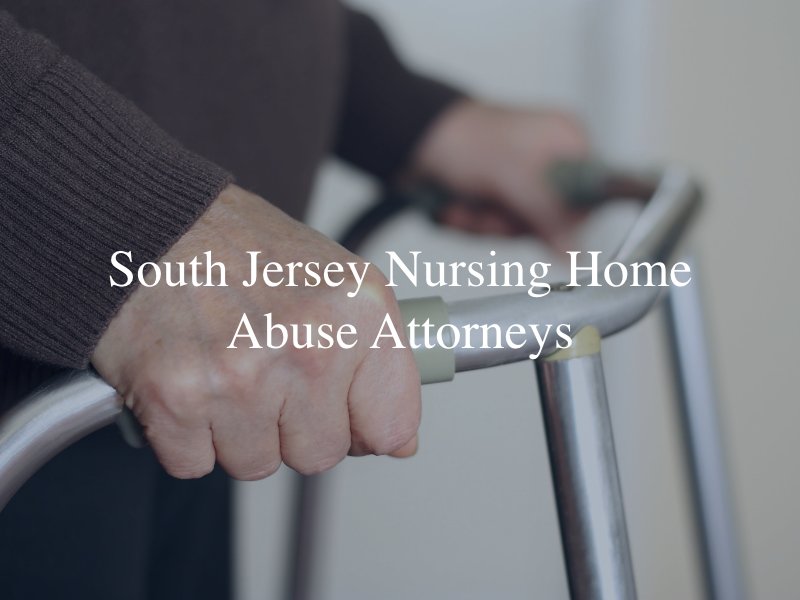South Jersey Nursing Home Abuse Attorney
Request a Free ConsultationWhen our elderly loved ones need a level of professional care that exceeds our limits, we entrust them to the care of strangers in a nursing home. By placing a beloved family member in a facility with around-the-clock care, we assume we are providing the best possible environment for their needs. Sadly, some facilities violate that trust when we discover that our vulnerable family member has been the target of abuse or neglect in a nursing home, the very facility we believed was best for their needs.
If your loved one has been harmed in a nursing home, you can help them achieve justice by letting the South Jersey nursing home abuse attorneys of Grungo Law amplify their voice and recover full compensation for damages. Although no amount of compensation can erase this devastating harm, it’s the only available means of achieving justice through civil action, separate from any criminal action against the liable party.
Why Choose A South Jersey Nursing Home Abuse Lawyer From Us?
The South Jersey injury lawyers at Grungo Law believe all elderly citizens deserve thorough, dedicated care with special consideration for the dignity, respect, and compassion that all seniors have earned over a lifetime of experience. Our team’s nursing home abuse lawyers will provide the following advantages for your claim:
- A free confidential case consultation and no upfront fees—instead, you pay nothing until we secure your loved one’s compensation
- Personalized strategies for your loved one’s unique case instead of cookie-cutter claims that don’t consider the individual circumstances of the injury, neglect, or abuse
- Classic client advocacy combined with the latest technologies to streamline a claim for the fastest results
- A strong local reputation and a track record of success to put a powerful voice behind your family’s nursing home abuse claim in New Jersey
With over $135 million in settlements and court awards, our attorneys have the experience and skills to give you and your family the strongest legal advocacy and representation you need for a successful claim for compensation and justice. We believe in open and honest communication throughout the process of an injury claim so you and your family are never left in the dark about the progress of your case.
How a Nursing Home Abuse Lawyer in South Jersey Can Help You
If you suspect your loved one is experiencing neglect or abuse in a South Jersey nursing home, an experienced attorney can guide you through this difficult time. A nursing home abuse lawyer can investigate the situation, gather evidence, and advocate for your loved one’s rights. They will hold negligent facilities accountable and pursue compensation for medical expenses, pain, and suffering. With a skilled nursing home abuse lawyer by your side, you can focus on your loved one’s well-being while ensuring their safety and dignity are protected. Reach out to a South Jersey nursing home abuse lawyer to seek justice today.
Types of Nursing Home Abuse

Elderly residents in full-time care are highly vulnerable in the hands of caregivers. Nursing home abuse has many facets and occurs even in the most highly respected facilities as well as those for low-income residents. Some sadly common forms of abuse in nursing homes include the following:
Physical Abuse in Nursing Homes
An astonishing 24.3% of family members report that their elderly family member suffered physical abuse in a nursing home according to the Nursing Home Abuse Center. Physical abuse means the intentional infliction of harm and includes the following:
- Hitting/punching
- Pushing
- Kicking
- Wrongfully restraining
- Sexual abuse
Physical abuse is egregious wrongdoing and leaves nursing home administration liable for damages as well as facing the possibility of criminal assault charges. Some cases of nursing home abuse result from abusive caregivers, but others may stem from abuse from other residents. The nursing home staff has a duty to protect vulnerable residents from abuse by other residents inside the facility.
Nursing Home Neglect
Neglect is another all-too-common type of abuse in nursing homes. When staff members are poorly trained, overworked, and under-supervised, neglect can take place in the following forms:
- Dehydration
- Malnutrition
- Poor hygiene
- Untended, infected bed sores
- Falls
- Infections
- Medication mistakes
- Unkempt appearance
- Unclean bed sheets and living space
When nursing homes are understaffed or engage in negligent hiring and training practices, residents may suffer from nursing home neglect with potentially devastating consequences.
Financial Abuse
Nursing home residents are also vulnerable to financial abuse. Unethical caregivers or other staff may make unauthorized transactions in a resident’s accounts or appeal to a senior’s compassion by asking for money for their personal use.
Injuries Associated With Nursing Home Abuse
If you suspect an elderly loved one may be experiencing abuse in a nursing home or assisted living facility, it’s important to know the types of injuries they might experience so you can be watchful for the signs of injury. Injuries commonly associated with nursing home abuse cases include the following:
- Fractures
- Head injuries
- Bumps and bruises
- Infected bedsores or bedsores reaching level four with muscle and bone exposure
- Cuts and bruises
- Soft tissue injuries
- Injuries to sex organs
It’s important to watch for signs of abuse if you have an elderly loved one in a nursing home. Many residents don’t talk about their abuse either due to fear of retaliation from staff members or due to dementia or incapacity.
Proving Abuse in Nursing Homes
If you suspect your elderly loved one has experienced abuse in a nursing home, it’s important to document evidence to prove that abuse took place whenever possible. It’s sometimes possible to prove that abuse took place by doing the following:
- Obtaining medical records from before and after the alleged abuse
- Photographing visible injuries and broken personal items
- Checking the local ombudsman for similar complaints of abuse in the same nursing home
- Eyewitness testimony or statements
- Checking past facility inspection records for any previous citations
- Consulting with medical experts
It can be difficult to prove a nursing home abuse case, especially when the elderly abuse victim has dementia or decreased cognitive ability. A nursing home abuse attorney can diligently investigate the circumstances of the abuse to document any evidence available that can benefit a claim for compensation.
How Much is My Claim Worth in South Jersey?
No two nursing home claims are the same, and the amount of compensation available depends on the circumstances. Compensation may include the cost of medical expenses and emotional counseling after an injury. It may also include compensation for pain and suffering or wrongful death benefits for the families of nursing home residents who died as a result of abuse or neglect.
Signs of Nursing Home Abuse
Federal nursing home regulations define abuse as “ the intentional infliction of injuries, unreasonable confinement, intimidation, or withholding of care.” Any “punishments” a staff member inflicts on an elderly resident that results in physical harm or mental anguish are egregious forms of nursing home abuse. Sadly, many victims of abuse in nursing homes are physically or mentally unable to tell their loved ones of their injuries, and others refrain from complaining out of shame or fear of retaliation from their abusive caregivers. Some signs of nursing home abuse include the following:
- Bandages and bruises
- Fractures
- Head injuries
- Bloodstains and torn clothing and bedding
- Broken personal items such as eyeglasses, dentures, and hearing aids
- Marks around the mouth, wrists, and ankles
- Bleeding and bruising of the genitals or anus
- Anxiety and emotional withdrawal
- Reluctance to talk in front of caregivers
- Poor hygiene, bedsores, and malnutrition
The elderly are as vulnerable to abuse as young children. A horrifying statistic warns family members that 40% of nursing home residents report experiencing abuse. It’s estimated that the true number is far greater since many residents aren’t capable of reporting abuse.
If you suspect abuse, make a report to the police right away and then call a South Jersey injury lawyer at Grungo Law. We have nothing but compassion for elderly victims of this most devastating type of personal injury.
What to Do If You Suspect Abuse
It may be difficult to believe that anyone would intentionally or neglectfully harm a fragile elderly person, but nursing home abuse happens every day. It’s important to monitor your elderly family members inside a nursing home or long-term care facility and talk to them about their daily experiences inside the facility.
If you suspect your elderly loved one is experiencing abuse in a nursing home, it’s critical to act quickly to remove them from a dangerous situation or to remove the danger to them by reporting individual staff members who are guilty of abuse.
First, report the suspected abuse to the nursing home administrator, the local authorities, and Adult Protective Services in your state. Then, hire an attorney from the South Jersey nursing home abuse lawyers at Grungo Law.
Seek medical attention for your elderly loved one and ask for a complete medical evaluation with a detailed report documenting any signs of neglect or abuse. Speak to your loved one about their experience and reassure them that they won’t face repercussions from abusive caregivers if they talk about their abuse.
Liability in South Jersey Nursing Home Abuse Claims
Those tasked with caring for vulnerable loved ones owe a duty to provide care at the accepted standards of the medical community and to protect vulnerable elderly residents from harm. When a nursing home facility fails in this duty and a patient sustains physical and emotional injuries, the facility is liable for damages. A civil claim for recovering damages can proceed regardless of any pending criminal charges or whether or not there is a criminal conviction. A successful claim means the facility owes damages to the injured elderly victim and/or their close family members.
What Damages Can I Recover From a Nursing Home Abuse Case in South Jersey?
If your elderly family member has suffered abuse in a nursing home, the South Jersey nursing home abise lawyers at Grungo Law are ready to passionately advocate for the maximum compensation for damages including:
- Medical care to treat injuries
- Ongoing medical and psychological treatment
- Pain and suffering
- Emotional anguish
- Punitive damages
New Jersey tort law allows victims of the most egregious forms of personal injury to file for punitive damages up to 5 times the amount of compensation awarded or $350,000 dollars, depending on which is greater. Punitive damages aren’t meant as compensation, but as a punishment and deterrent to the liable party, but they can also help relieve financial burdens for families of abuse victims who require ongoing care.
Unfortunately, some instances of abuse are so severe that they can be fatal, and our wrongful death lawyers in South Jersey are here for you if require their professional experience.
Contact Our South Jersey Nursing Home Abuse Lawyers Today
At Grungo Law, our South Jersey nursing home abuse attorneys believe every elderly person deserves to be treated with kindness and consideration for their dignity. We will proudly advocate for the maximum compensation for the damages caused by nursing home staff members who abuse or neglect the vulnerable elderly residents entrusted into their care. Contact our law office today so we can ensure your loved one’s voice is heard.
